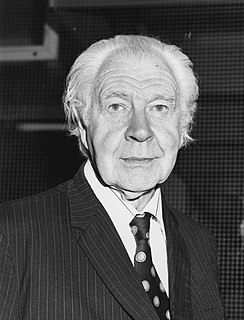A Quote by Immanuel Kant
Democracy is necessarily despotism, as it establishes an executive power contrary to the general will; all being able to decide against one whose opinion may differ, the will of all is therefore not that of all: which is contradictory and opposite to liberty.
Related Quotes
It has been said that terror is the principle of despotic government. Does your government therefore resemble despotism? Yes, as the sword that gleams in the hands of the heroes of liberty resembles that with which the henchmen of tyranny are armed ... The government of the revolution is liberty's despotism against tyranny.
Now, you receive all your ideas; therefore you receive your wish, you wish therefore necessarily. The word "liberty" does not therefore belong in any way to your will....The will, therefore, is not a faculty that one can call free. A free will is an expression absolutely void of sense, and what the scholastics have called will of indifference, that is to say willing without cause, is a chimera unworthy of being combated.
It equally proves, that though individual oppression may now and then proceed from the courts of justice, the general liberty of the people can never be endangered from that quarter; I mean so long as the judiciary remains truly distinct from both the legislature and the Executive. For I agree, that "there is no liberty, if the power of judging be not separated from the legislative and executive powers." And it proves, in the last place, that as liberty can have nothing to fear from the judiciary alone, but would have every thing to fear from its union with either of the other departments.
?A general State education is a mere contrivance for moulding people to be exactly like one another; and as the mould in which it casts them is that which pleases the dominant power in the government, whether this be a monarch, an aristocracy, or a majority of the existing generation; in proportion as it is efficient and successful, it establishes a despotism over the mind, leading by a natural tendency to one over the body.
The new education must consist essentially in this, that it completely destroys freedom of will in the soil which it undertakes to cultivate, and produces on the contrary strict necessity in the decisions of the will, the opposite being impossible. Such a will can henceforth be relied on with confidence and certainty.
Disregarding all evidence to the contrary, the student of Truth will maintain that he lives in a PERFECT Universe and among people potentially perfect. He will regulate his thinking to meet this necessity and refuse to believe in its opposite. At first he may be influenced by conditions, and he may appear weak, but as time goes on he will PROVE TO HIMSELF that his position is a correct one, for that which appears imperfect will begin to slip from his experience
For, contrary to the common opinion, it is the wealthy who are greedy of wealth; while the populace are to be gained by talking to them about liberty, their unknown god. And so much are they enchanted by the words liberty, freedom, and such like, that the wise can go to the poor, rob them of what little they have, dismiss them with a hearty kick, and win their hearts and their votes for ever, if only they will assure them that the treatment which they have received is called liberty.
..(T)here are two opposite reasons for being a democrat. You may think all men so good that they deserve a share in the government of the commonwealth, and so wise that the commonwealth needs their advice. That is, in my opinion, the false, romantic doctrine of democracy. On the other hand, you may believe fallen men to be so wicked that not one of them can be trusted with any irresponsible power over his fellows.
It may not be improper, however, to remark two consequences, evidently flowing from an extension of the federal power to every subject falling within the idea of the "general welfare." One consequence must be, to enlarge the sphere of discretion allotted to the executive magistrate... The other consequence would be, that of an excessive augmentation of the offices, honors, and emoluments, depending on the executive will.
I am committed against every thing which in my judgment, may weaken, endanger, or destroy (the Constitution) ... and especially against all extension of Executive power; and I am committed against any attempt to rule the free people of this country by the power and the patronage of the Government itself.








































